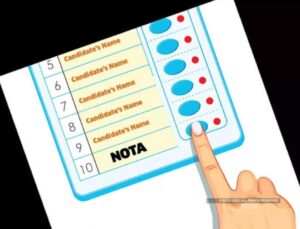NOTA IN ELECTION STANDS FOR –
INDIAN ELECTIONS 2024
NOTA, or “None of the Above,” is an option on ballot papers in some jurisdictions, allowing voters to indicate disapproval of all candidates in an election.
The concept originated in the United States and gained prominence in the 1976 Supreme Court case Burdick v. Takushi, where the court ruled that states could not require voters to cast affirmative votes but could allow them to express disapproval through abstention.

In India, the introduction of NOTA came about through a landmark judgment by the Supreme Court in September 2013.
The court directed the Election Commission to provide a NOTA option on Electronic Voting Machines (EVMs) and ballot papers to enable voters to exercise their right to reject all candidates.
The introduction of NOTA in Indian elections stems from a significant judgment by the Supreme Court in September 2013, known as the People’s Union for Civil Liberties (PUCL) v. Union of India case.
The bench that delivered this landmark verdict consisted of Chief Justice P. Sathasivam, Justice Ranjan Gogoi, and Justice M.Y. Eqbal.
In the PUCL v. Union of India case, the Supreme Court ruled that voters in India have the right to reject all candidates contesting in an election, expressing their dissatisfaction with the choices presented.
The court emphasized that this right to reject candidates is an integral part of the fundamental right to freedom of expression under Article 19(1)(a) and the right to equality under Article 21 of the Constitution of India.
The bench held that the inclusion of a NOTA option on EVMs and ballot papers would enhance the transparency and fairness of the electoral process, as it would allow voters to make an informed choice, even if it is a choice to abstain from voting for any candidate.
The court asserted that NOTA would serve as a powerful tool for voters to express their disapproval of the candidates and parties, thereby encouraging political parties to field more competent and deserving candidates.
Following the Supreme Court’s directive, the Election Commission of India implemented the NOTA option in subsequent elections, providing voters with the opportunity to exercise their right to reject all candidates if they find none of them suitable.
The PUCL v. Union of India judgment marked a significant milestone in Indian electoral history, reaffirming the importance of voter empowerment and strengthening democratic principles. It underscored the judiciary’s role in safeguarding citizens’ rights and promoting transparency and accountability in the electoral process.
This decision was based on the argument that the right to vote also includes the right not to vote for any candidate.
The significance of NOTA lies in its empowerment of voters to express dissatisfaction with the available choices.
It serves as a means of protest against the quality of candidates presented by political parties, encouraging parties to nominate more qualified and ethical candidates.
Additionally, NOTA promotes transparency and accountability in the electoral process by highlighting the level of discontent among voters.
NOTA is important because it strengthens democracy by promoting voter participation and engagement. It provides citizens with a mechanism to voice their discontent with the existing political landscape and incentivizes parties to improve candidate selection processes.
Furthermore, NOTA helps to uphold the principle of freedom of expression by allowing voters to register their dissent through legitimate means. Overall, NOTA plays a crucial role in enhancing the democratic process and fostering a more responsive and accountable political system.
Citizen participation in the carnival of democracy is vital for its vibrancy and legitimacy.
Through voting, activism, and engagement, citizens shape the direction of their nation, holding leaders accountable and ensuring representation.
Active involvement fosters a robust democratic culture, where diverse voices are heard and collective decisions reflect the will of the people.
http://www.worldinsightews.com